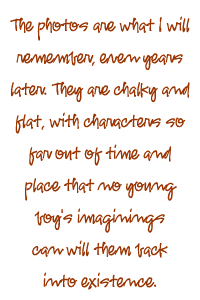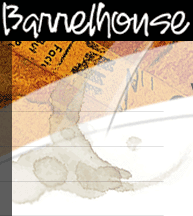|
|
 |
 |

by Mike Ingram
My great grandmother’s house in early spring: my mother and I are trudging up the long, narrow driveway from the street, where my grandmother has parked the car to avoid the spray of gravel. She shuffles along a few feet behind us, stopping every so often to catch her breath or pull a small stone from inside one of her sandals.
We have come here to clean up the mess of a life, boxes of books and letters and photographs, all the things that cannot be thrown away or given to Goodwill. The year is 1989, and I am twelve – too young still to be sentimental. To me it is just a day of work, something to be endured.
 The photos are what I will remember, even years later. They are chalky and flat, with characters so far out of time and place that no young boy’s imaginings can will them back into existence. In one photo, three women and two men stand on the front porch of this very house. They are dressed as if for church, the men in ties and suspenders, the women in long dresses. Everything looks dusty – their clothes, their faces, the house itself. To my 12-year-old eyes, they are the stuff of history books, or classroom filmstrips. I know, of course, that two of these people are my great grandparents, but I’m too timid or else too foolish to ask. My mother and grandmother are in the kitchen anyway, busy with their own work. The photos are what I will remember, even years later. They are chalky and flat, with characters so far out of time and place that no young boy’s imaginings can will them back into existence. In one photo, three women and two men stand on the front porch of this very house. They are dressed as if for church, the men in ties and suspenders, the women in long dresses. Everything looks dusty – their clothes, their faces, the house itself. To my 12-year-old eyes, they are the stuff of history books, or classroom filmstrips. I know, of course, that two of these people are my great grandparents, but I’m too timid or else too foolish to ask. My mother and grandmother are in the kitchen anyway, busy with their own work.
The funeral was the day before, but I wasn’t allowed to attend. It will be years before it occurs to me to think about that decision, why I was excluded from the church and the graveyard but made to come to my great grandmother’s house the next day and sort through her things. I am sure it says something about my family and the way we celebrate and grieve, how we protect our loved ones and also thrust them out into the world a little at a time. How we parcel out their experience.
The last time I saw my great grandmother, she sat quietly in the corner of her small living room, flipped through a large-print King James Bible and cracked open peanut after peanut with slim fists. My mother practically shoved me in there from the kitchen, and I plopped myself down on the couch just a few feet away from her. Truth be told I was scared of my great grandmother. Or maybe scared isn’t the right word. Uneasy. Her skin was dark year-round and cut with deep wrinkles, and her gray, stringy hair hung halfway down her back. And she smelled funny, I thought, a sharp sweetness like too-ripe fruit.
She told me a story that day about her wedding, and how my great grandfather picked her up in a horse drawn carriage, then paraded her down the one, thin street of their town and then to the chapel, where her father performed the ceremony to a handful of witnesses.
My great grandmother watched as that chapel turned to a church, as the road was widened and then paved, as carriage turned to car and men touched wings to sky and flew. How strange it must have been, years later, to ride shotgun in her daughter’s car every Thursday for her pills. The rattle and hum of the engine beneath her, the tug of centrifugal force as the car picked up speed and rounded a corner.
She watched as crop prices rose then fell, as grain fields near the house turned quickly to factories, then back to fields, then quickly again into dust. She watched as first her husband and then her eldest son – a pale-skinned boy with the nose of a boxer – shipped off to war and returned as only so much dust and memory.
In quiet moments, when I am older, I will sometimes squint up my eyes and picture the young, happy couple. He comes home early from the fields – a day cut short by rain – and lifts her from the waist with thick forearms. He sets her down on the corner of the bed, peers into her eyes and sees his own heart.
Or perhaps what he sees are the generations that would quickly follow – my grandmother, a replica of the original; my mother with her straight, fine hair; then me with those same eyes, blue into blue like the sea at sunset .
Of course I’m not thinking of these things that afternoon at her house, sitting cross-legged on the hardwood floor and wrapping pictures and knick-knacks in newspaper. Instead I want to go home and squat in front of the television, or dig in the dirt with my cousins. The year is 1989, after all, and I am twelve. I have hours and years to go still before heartbreak, or sorrow, the sudden panic of loss.
Even more years before I start to think of the connections of blood and memory, how they course through our bodies like twin rivers, how they flow from one person to the next, binding us, and how they never, ever stop.

|
|
|




